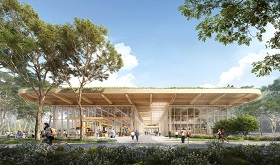In today’s mixed company, mentioning politics frequently elicits discomfort, averted glances, and nervous asides intended to steer the conversation toward safer waters. At holiday gatherings, many families say they avoid the topic out of fear of upsetting relatives with opposing viewpoints and ruining the occasion.
Today, social media platforms keep potential customers online for advertisers, outrage and indignation are staples of our public discourse, the means by which many politicians raise money and support, and
When divide-and-conquer politics and media algorithms have helped turn state against state, neighbor against neighbor, and lowered our expectations for what we can accomplish together, our national credo, “e pluribus unum,” which means “out of many, one,” seems mockingly out of step.
But there was a time, a season, and a night not too long ago that was more hopeful, and it serves as a reminder that America can do better.
Quite a while back Tuesday, Barack Obama staggered the world by winning the Iowa Popularity based gatherings, the first — and generally significant — step in his long and impossible walk to the administration.
Obama began his campaign as a clear long shot, preaching a message of unity, reconciliation, and reform to a nation deeply divided over the Iraq war and ensnared in hyperpartisanship in Washington.
That Iowa, perhaps of the Whitest state in the country, would, on that chilly winter night, embrace a youthful, Person of color, only three years eliminated from the Illinois Senate, conveyed a message of reality and probability about his bid. It also gloriously defied the accepted wisdom regarding the limitations of American possibilities.
It was a moving affirmation, not just of a uniquely talented candidate, for those of us who worked on Obama’s campaign. It was an unforgettable night. It was a test of the idea that ordinary citizens had the power to unite and alter the course of history and that we as Americans shared more than the things that divided us.
A year of sincere conversations between Obama and Iowans in their homes, schools, businesses, and other gathering places culminated in the caucuses. Young staff members and thousands of volunteers, many of whom took time off from their homes and jobs to embed themselves in Iowa to assist in bringing about change and progress throughout the nation, amplified these discussions. One young Obama staffer was asked by locals in Algona, Iowa, the small town he was organizing, to stay after the caucuses and run for the local City Council because of how close these organizers were to the community.)
Iowans also played a crucial role by attending meetings with candidates and putting them through their paces. Understanding the significance of Iowa as host to the first-in-the country naming challenge, a large number of its residents would end up having numerous discussions with the competitors prior to resolving to help one in the councils. Drive-bys and glib lines were ruled out. Candidates for president need to be ready for serious discussions if they want the support of their caucus.
Also, these discussions were not just performative. Obama was a newcomer to national politics, but the 87 days he spent in Iowa leading up to the caucuses made him a much better candidate. Furthermore, it would make him a better President. He improved his thinking and presentation by listening to a lot of other people’s stories, ideas, and reactions to his own.
Iowa also sized candidates appropriately. Obama was once asked to call a high school student leader in Iowa, where young people who would be 18 on Election Day could participate in the caucuses, while we were traveling.
Our local political team suggested that this student might be the key to getting her classmates’ caucus commitments. Obama called and welcomed her with a merry welcome. However, the girl abruptly cut him off. She elaborated, “I’m about to enter the classroom.” Might you at some point get back to later?”
Obama smiled as he recalled the brief conversation and returned the phone. Man, it can be humbling to run for president!”
The chilly holiday season of 2007 served as the backdrop for the lead-up to the caucuses. As a new wave of volunteers flooded in to knock on doors and staff phones in search of last-minute commitments prior to caucus day, Obama barnstormed the snowy state with a voice that was almost gone.
The mission central command in midtown Des Moines, tossed with espresso cups and pizza boxes, was spilling over with individuals and energy and a light feeling of mission. My wife, Susan, and our youngest son were among the volunteers who were cheerfully bundled up against the cold and working the main hotline in an adjacent, unheated annex.
Susan received a particularly moving call from a woman who yearned to “stand for Obama” at her neighborhood caucus, where neighbors divided a room into sections according to their choice of candidate. But I can’t stand because I’m in a wheelchair,” the woman said anxiously. Will I still be counted?”
I tried to convince Susan and my son to go to the hall where Obama would speak after the caucuses started. I wanted to enjoy the moment with my family because the reports I was receiving suggested that we would win. She stated, “I want to stay just in case there are some late calls.”
The outcomes were abundantly clear when Susan finally reached the hall. I saw her and cut through the crowd with a knife. We wept and hugged. In my entire career in politics, it remains one of the most sublime experiences I have ever had. Obama took the stage and delivered a speech that beautifully conveyed the journey’s significance.
He began, “You know, they said this day would never come.” They claimed that our goals were too lofty. They claimed that this nation was too divided and disillusioned to ever unite for a common cause.
“But you have done what the skeptics said we couldn’t do on this January night, at this defining moment in history…. You gathered as Democrats, Republicans, and independents to declare that we are one nation in lines that surrounded schools and churches, in both large and small towns. We are all one group. Furthermore, the time for change has come.
Everything now seems like a distant memory after fifteen years. A bitter irony for Iowa Democrats, I’m sure, considering the extraordinary role the caucuses played in launching America’s first Black President, the Iowa Democratic caucuses are on their way out, the victim of their clumsy administration in 2020 and the desire within the party to promote more racially diverse states to open the nomination process.
More importantly, given the extreme polarization and acrimonious, reactionary politics that have emerged since then, the possibility of national reconciliation that Iowa signaled may appear to many to be a faded dream.
However, democracy is a never-ending struggle between optimism and pessimism.
In addition to serving as a fond memory and a reminder of what America can be, I think back to that wonderful, sky-high night 15 years ago.


